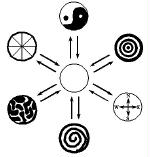|
|
The delusion of learning from experience |
|
A Releasing Your Unlimited Creativity discussion topic | |
|
Copyright 2009 by K. Ferlic, All Rights Reserved | |
| RYUC Home Why free? Contact Links Programs Services Contributions | |
|
There is an old adage which states, "Experience is the best teacher." Although there is a truth in this statement and some of the most powerful learning comes through experience, there is the another adage which states, "An individual learns from their experience, a wise individual learns from the experience of others, and a fool never learns." However, there are several reason why individuals do not learn from their experience. Probably the single greatest reason we do not learn from our experiences is we do not look critically at our actions to see where we have been, or have not been, successful as to whether or not we are able to create what we desire. A second reason we do not learn from our experience is we do not pull the string as to why we created the experience we have to understand what is really motivating our actions. We have our reasons for acting. But few look to see why we have the reasons we do. In doing so we can uncover nonconscious beliefs and programming that we do not even realize are controlling our action and maybe our lives. The third reason we do not learn from our experiences is we do not look to see what cause and effect they actually produced. Learning from experience is best done where we see the consequences of our actions in clarity without ambiguity. If the consequences of our actions are too far removed in time, we tend not to see the consequences nor learn from the experience. However, that need not be the case. Our problem is we look at our actions as occurring in a single moment in time. Rarely do we look to see how our actions have affected others and what our actions may cause to happen in the future. It is interesting to get a phone called or called into someone’s office two or three years after you acted to be told how powerful your action at a given moment affected someone’s life. It is even more powerful to know you took an unpopular stand because it was the correct things to do and to know your action made a significant difference that continued to ripple out into the world. It is also disquieting to know that you hired someone who really wasn’t fit for the job because you suspended the normal hiring process for reasons that in hind sight were not valid. There is an old adage about being aware of our action unto seven generations. It is know that what we say and do in the right moment can ripple out far and beyond. To have such and awareness we need to begin to look at all our actions and experiences we have for what they are really teaching about how and what we think and believe and whether or not what we think and believe is allowing us to perceive the situation as it exist or how we like to see it. Although there are decisions we make and experiences we have whose consequences are felt system wide and/or span years or decades, we can still learn from those experience although we may not see or directly experience their consequences. The way to do this is to realize all is interconnected and our decision are that powerful, even the seemingly small ones. It needs to be realize paying attention to someone and given them a word of encouragement may keep them from committing suicide in a depressed moment. Such events have been know to happen. If we learn to make our decision in awareness and look at the causes for the experiences we have, we will begin to make decisions were we need not to worry about the consequences for we will have made the best possible decision we could make. It is to become impeccable in all our actions. We only do that by critically looking at all our action. If we become impeccable in our actions we need not worry about seeing the consequences to know if we did the right thing. Quite simply, if we were impeccable, we could not have done any better. In many ways, becoming impeccable in our actions is to be about developing the ability to reflect on our thinking while we are acting or making the decision. At first this seems difficult but it action not to difficult to learn. A good example of what it means to reflect on our thinking while acting is the story of the Samurai warrior who has chased a terrible bandit into a corner. The warrior pulled out his sword to strike the bandit. But just as the warrior was going to strike the bandit, the bandit spit on him. In being spat upon, the warrior resheathed his sword and did not strike the bandit. What had been an act of duty in complete detachment and dispassion at killing the bandit turned into personal act of anger and being spat upon. The warrior knew he could not kill in anger for it was against his code of honor so he had no choice but to resheath his sword. Here the warrior was completely aware of what he was thinking and doing and acted impeccably. The ability to act impeccably starts with obtaining personal mastery. Related topics The Password Protected Area provides access to all currently posted (click for current loading) Releasing Your Unlimited Creativity related discussion files and applications. |
|
|
RYUC Home Why free? Contact Links Programs Services Contributions | |
